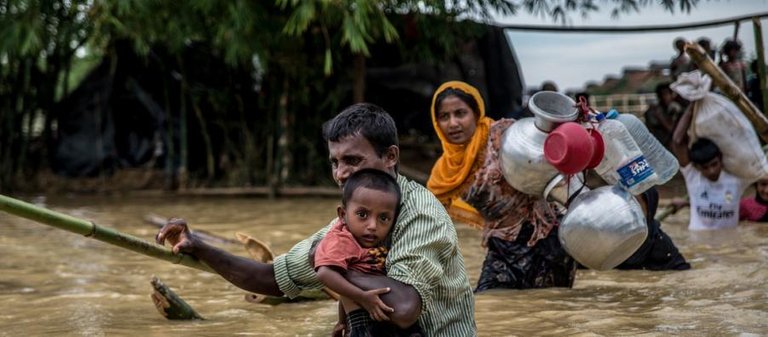
A father carries his son across a broken bridge on the edge of Balhukali camp, Bangladesh. Heavy rains flooded the areas where people had set up temporary shelters, forcing them to move to higher ground.
Close to a million Rohingya people have fled violence in Myanmar to seek refuge across the border in Bangladesh. This unprecedented number of refugees, of whom more than half are children, has caused a large-scale humanitarian crisis. Oxfam is responding
The fastest-growing refugee crisis in the world
Over 671,000 Rohingya refugees have arrived from Myanmar's Rakhine State in Bangladesh’s south-eastern districts since August 2017, and hundreds more are arriving every week. They join hundreds of thousands who are already living in refugee camps and with local communities. More than half of them are women and girls, 60 percent are children under 18.
Many have arrived injured and deeply traumatized by their experiences, with just the clothes on their backs. They need food, clean water and shelter to survive, but above all they need to feel safe. People are living in makeshift tents in hugely overcrowded settlements. Conditions in the camps are woefully inadequate and unhealthy, with overflowing latrines and contaminated water. They’re largely unlit and dangerous at night – women, girls and children are particularly vulnerable to abuse, exploitation and trafficking.
Oxfam is responding
We are currently focusing on providing water and sanitation and adapting to better deal with the crowded conditions and sheer numbers of people.
• We are installing a sewage facility which will initially serve 50,000 people, which will rise to 100,000.
• We are drilling wells and installing water points, toilets and showers. To help local communities cope with water shortages, we are providing an average of 300,000 liters of chlorinated water daily in the Teknaf area.
• We’re helping people stay healthy and hygienic by distributing soap and other essentials, and working with community-based volunteers to emphasize the importance of clean water and good hygiene.
We’re also providing 23,000 households with vouchers that can be exchanged at local markets for nutritious vegetables and ingredients to supplement their basic rations.
APN Daily Rohingya News Today 24 May 2018,Thursday
I call your name @Ramta Reddington to judge my comment